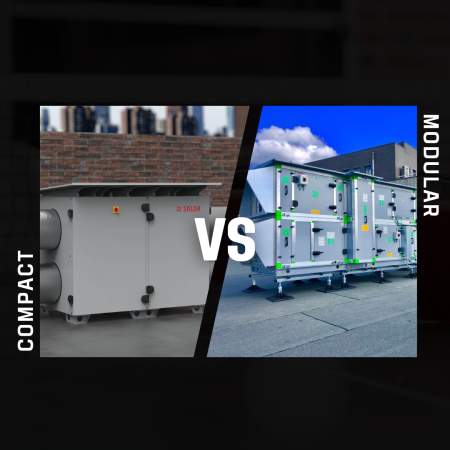Selecting Air Handling Units: Compact vs Modular
- Home
- Blog

When exploring the options for air handling units (AHUs) in your HVAC system, the terms "compact" and "modular" often come up. These two types of AHUs serve the same fundamental purpose: to condition and circulate air as part of heating, ventilating, and air-conditioning (HVAC) systems. However, they differ in design, scalability, customization, and cost. In this blog post, we'll dive into the differences between compact and modular air handling units, focusing particularly on how compact AHUs can be a more affordable solution due to their standardized nature compared to the bespoke modular solutions.
Compact Air Handling Units
Compact air handling units are pre-assembled systems designed to meet a wide range of general air handling requirements. They are called "compact" because of their predefined sizes and capacities, which make them a one-piece solution that's easy to install and operate. Here are some of the key features and benefits of compact AHUs:
Standardization: Compact AHUs are manufactured in standard sizes and specifications. This standardization leads to economies of scale in production, making them a cost-effective option for many applications.
Affordability: Due to their mass-produced nature, compact AHUs are generally more affordable than their modular counterparts. The cost savings come not only from the unit itself but also from reduced installation and operational costs.
Simplicity and Ease of Use: Their pre-configured design means compact AHUs are simpler to install and have shorter lead times. They are ideal for projects with tight timelines and for spaces that can accommodate standard unit sizes.
Efficiency: While compact AHUs may not offer the same level of customization as modular units, they are designed to be highly efficient within their predefined range of operation.
Modular Air Handling Units
Modular air handling units, on the other hand, offer a higher level of customization. They are built to order and can be tailored to meet very specific requirements of a building's HVAC system. Here are some characteristics of modular AHUs:
Customization: Modular AHUs can be customized in almost every aspect, including size, capacity, component types, and configuration. This makes them suitable for applications with unique or complex requirements.
Scalability: A significant advantage of modular AHUs is their scalability. They can be designed to allow for future expansion or reconfiguration, adapting to changes in building use or occupancy without the need for complete replacement.
Performance: With the ability to tailor components and configurations, modular AHUs can achieve optimal performance for specific environments, potentially leading to better air quality and energy efficiency.
Cost: The bespoke nature of modular AHUs means they are generally more expensive than compact units. This includes higher initial costs for design, manufacturing, and installation, as well as potentially higher maintenance costs due to the complexity of the customized components.
Making the Choice: Compact vs. Modular AHUs
The decision between compact and modular AHUs ultimately depends on the specific needs of your project. Compact AHUs offer an affordable, straightforward solution that is easy to implement, making them suitable for a wide range of applications, especially where standardization aligns with the project requirements. They provide a balance of efficiency, cost-effectiveness, and ease of use that is hard to beat for many scenarios.
Modular AHUs, while more expensive, offer a level of customization that can be necessary for certain complex or unique environments. They are the go-to option when the project demands specific performance characteristics that standard units cannot provide.
In summary, when affordability and standardization are key priorities, compact air handling units present a compelling option. Their standardized design and production make them a cost-effective choice for many HVAC projects, offering a blend of performance and value that suits a broad range of applications. However, for those projects where unique requirements or scalability is a must, the investment in a modular solution can pay dividends in terms of customization, performance, and adaptability.